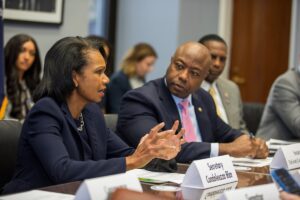Abortion, elections, education laws take effect Friday in North Carolina
(The Center Square) – Twenty-six new North Carolina laws are scheduled to take effect Friday when the calendar turns to December.
They include the emotionally fraught battles for laws on…

(The Center Square) – Twenty-six new North Carolina laws are scheduled to take effect Friday when the calendar turns to December.
They include the emotionally fraught battles for laws on abortion, elections and in K-12 education, a bill of rights for parents and transparency for high school athletics. All are tied to Dec. 1, according to the General Assembly website.
The Care for Women, Children, and Families Act stops abortions after 12 weeks of pregnancy with limited exceptions. The state’s previous law stopped abortions after 20 weeks. There are exceptions through 20 weeks for rape and incest, and through 24 weeks for “life-limiting” fetal anomalies. There is a medical emergency exception.
A three-judge panel from the state Supreme Court on Thursday will hear Gov. Roy Cooper’s challenge to No Partisan Advantage in Elections, one of the election law changes set to take effect. The governor lost a round in this battle during the summer when the General Assembly overturned his veto.
The new law would change the state Board of Elections from a five-member majority same party as the governor to an eight-member board with representation chosen by respective party leadership in each General Assembly chamber.
The new board is scheduled to take their seats Jan. 1, same as for the 100 county boards. The law makes changes for those, reducing from five members majority same party as the governor to four members with representation chosen by respective party leadership in each General Assembly chamber.
Elections Law Changes, another Senate bill, is also to take effect Friday. It strengthens the rights of poll observers; starts a pilot program in some counties to use signature verification software for absentee ballots; improves voter registration roll maintenance techniques; and closes a same-day registration loophole.
The Parents’ Bill of Rights enhances public school transparency, outlines the rights and responsibilities of parents and installs guardrails on curriculum dealing with gender identity and sexual orientation. Also, the law would subject state employees to disciplinary action if they attempt to encourage or coerce a child to withhold information from a parent.
The majority of the language in the DOI & Insurance Law Amendments/Revise HS Athletics, a Senate bill, is mostly related to the Department of Insurance. The biggest impact of the high school athletics changes will be increased transparency, to include compliance in some areas with the state’s public records laws, and the weakening of control by the North Carolina High School Athletic Association in favor of the Superintendent of Public Instruction and the state Board of Education.
Part 17 of the legislation is to “revise oversight of high school interscholastic athletics.” Statutes impacted include definitions; rules, administration, enforcement, conduct and athletic reports for high school interscholastic athletic activities; memorandum of understanding requirements; and middle schools.
Part 18 is the “recodification and reorganization of current interscholastic athletics statutes,” Part 19 is the “implementation of interscholastic athletics rules,” and Part 20 handles “conforming change to interscholastic athletics statutes.”
Among the other new laws are Prevent Rioting and Civil Disorder; Protect Critical Infrastructure; Nondiscrimination & Dignity in State Work; Modify Human Trafficking and Rioting Laws; Fentanyl Drug Offenses and Related Changes; and Protect Our Students Acts.
The full list is on the North Carolina Legislature website.



